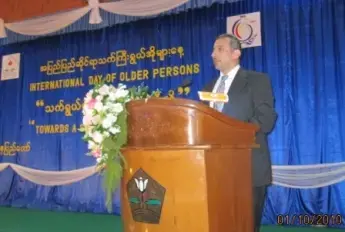NAY PYI TAW, Myanmar — UNFPA, the United Nations Population Fund, and the Ministry of Social Welfare, Relief and Resettlement, and HelpAge International Myanmar jointly organised a commemorative ceremony of the International Day of Older Persons at the nations capital today.
A wide range of stakeholders from government, civil society, the United Nations and the diplomatic community and 130 older persons attended the event.
At her opening address, Dr. Daw Myat Myat Ohn Khin, Union Minister for Social Welfare, Relief and Resettlement highlighted the importance of active and healthy ageing, the need to establish a mechanism to promote the quality of life of older persons, and the need to pay more attention to gender concerns and the special needs of older women.
In Myanmar, the proportion of elderly people has increased from 8.7 per cent of the population in 2007 to 9.1per cent in 2010 and is projected to reach 20 percent by 2050. The Minister noted that the Constitution of the Republic of the Union of Myanmar states that “the Union shall care for the aged,” and said, “ The Ministry of Social Welfare, Relief and Resettlement, and the Ministry of Health are carrying out elderly care activities in collaboration with UN agencies, INGOs and local NGOs.”
Addressing the demographic transition in Myanmar, UNFPA Representative Mohamed Abdel-Ahad called for developing a two-pronged policy: the first set of policies is to utilise the “demographic window of opportunity” of having nearly 60% of population in the working age (15-59). This requires promoting job opportunities and improving access to social services to increase per capita income, savings and investments and help boost economic growth. The second is “active ageing” policies aiming to enhance the health, participation and security of older persons, taking into account their rights, needs, preferences and capacities. Any policy should adopt a rights-based approach and ensure social inclusion and equity, he stressed.
Mr. Abdel-Ahad highlighted the recommendations of the most recent study on the socio-economic characteristics of ageing conducted by the Government, UNFPA and HelpAge International. These include: finalizing and implementing the draft National Plan of Action on Ageing; building a clearly defined system of social protection for older people to complement care by families; addressing vulnerabilities of older women; and educating the young about ageing issues.
Certifications of honour were awarded to donors who contributed to the event. The invited elderly persons including the oldest man aged 110 years old and the oldest women aged 120 years old, were presented with gifts and medicines.
One of the invited elderly persons presented the activities of Older People Self-Help Groups and highlighted the rights and the needs of elderly persons.
UNFPA, in cooperation with more than 20 UN agencies and international organizations, has just issued a publication entitled “Ageing in the Twenty-First Century: A Celebration and A challenge”. The report provides analyses of the current situation of older persons and reviews progress in policies and actions taken by governments and other stakeholders to implement the Madrid International Plan of Action on Ageing.
The report calls for building a society of all ages in which both young and old are given the opportunity to contribute to development and share its benefits. This requires investments to ensure income security, access to quality health care and enabling environment for active ageing.


